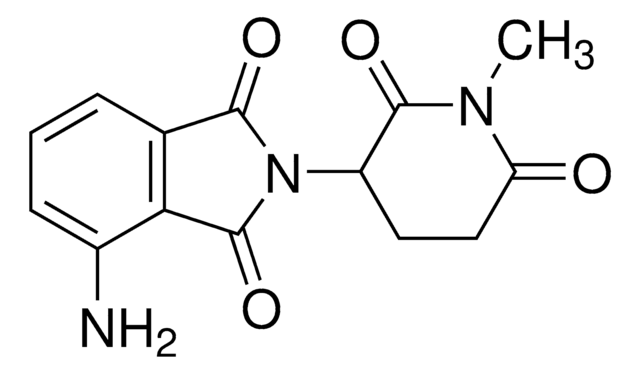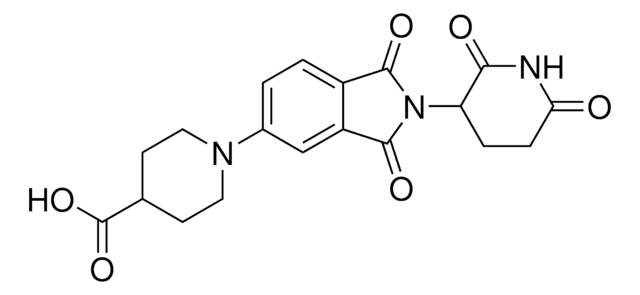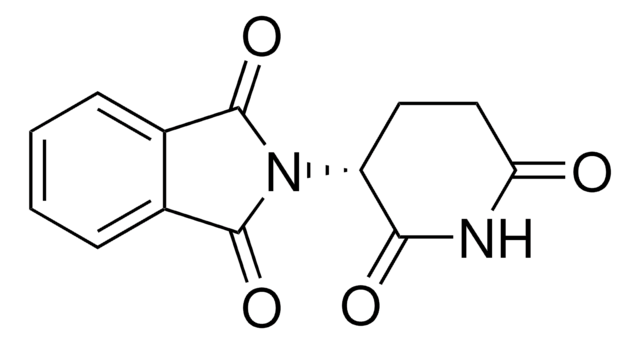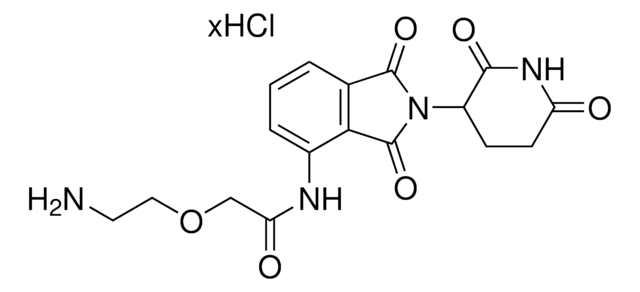901558
Lenalidomide
≥95%
Sinónimos:
1-Oxo-4-amino-2-(2,6-dioxopiperidin-3-yl)isoindole, 3-(4-Amino-1,3-dihydro-1-oxo-2H-isoindol-2-yl)-2,6-piperidinedione, 3-(4-Amino-1-oxoisoindolin-2-yl)piperidine-2,6-dione, E3 Ligase ligand, Ligand for PROTAC® research
About This Item
Productos recomendados
ligand
lenalidomide
assay
≥95%
form
powder
reaction suitability
reagent type: ligand
mp
265-268 °C
storage temp.
2-8°C
SMILES string
O=C1N(C2CCC(NC2=O)=O)CC3=C1C=CC=C3N
InChI
1S/C13H13N3O3/c14-9-3-1-2-7-8(9)6-16(13(7)19)10-4-5-11(17)15-12(10)18/h1-3,10H,4-6,14H2,(H,15,17,18)
InChI key
GOTYRUGSSMKFNF-UHFFFAOYSA-N
¿Está buscando productos similares? Visita Guía de comparación de productos
Application
.
Other Notes
Portal: Building PROTAC® Degraders for Targeted Protein Degradation
Structure of the human Cereblon–DDB1–lenalidomide complex reveals basis for responsiveness to thalidomide analogs
Lenalidomide causes selective degradation of IKZF1 and IKZF3 in multiple myeloma cells
The myeloma drug lenalidomide promotes the cereblon-dependent destruction of Ikaros proteins
Legal Information
Related product
signalword
Danger
hcodes
Hazard Classifications
Repr. 1B - STOT RE 2
target_organs
Blood
Storage Class
6.1C - Combustible acute toxic Cat.3 / toxic compounds or compounds which causing chronic effects
wgk_germany
WGK 3
flash_point_f
Not applicable
flash_point_c
Not applicable
Certificados de análisis (COA)
Busque Certificados de análisis (COA) introduciendo el número de lote del producto. Los números de lote se encuentran en la etiqueta del producto después de las palabras «Lot» o «Batch»
¿Ya tiene este producto?
Encuentre la documentación para los productos que ha comprado recientemente en la Biblioteca de documentos.
Los clientes también vieron
Artículos
Protein Degrader Building Blocks are a collection of crosslinker-E3 ligand conjugates with a pendant functional group for covalent linkage to a target ligand.
Protein Degrader Building Blocks are a collection of crosslinker-E3 ligand conjugates with a pendant functional group for covalent linkage to a target ligand.
Protein Degrader Building Blocks are a collection of crosslinker-E3 ligand conjugates with a pendant functional group for covalent linkage to a target ligand.
Protein Degrader Building Blocks are a collection of crosslinker-E3 ligand conjugates with a pendant functional group for covalent linkage to a target ligand.
Nuestro equipo de científicos tiene experiencia en todas las áreas de investigación: Ciencias de la vida, Ciencia de los materiales, Síntesis química, Cromatografía, Analítica y muchas otras.
Póngase en contacto con el Servicio técnico
















